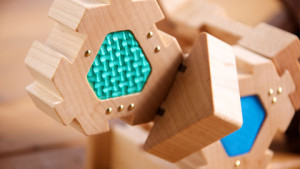At the heart of any great departure from the beaten path is an awareness that the prevailing modes of thought fail to account for your understanding of the world. For Ilana Ben-Ari, the Toronto-based social entrepreneur and founder of Twenty One Toys, the choice to strike out on her own came from the frustration she felt when faced with this dilemma. “It was hard for me to even find an organization looking at design and social innovation,” she said. “When I realized that maybe I should start my own company, a lot of that motivation came from frustration with my education; there’s a disconnect between what we’re focusing on in education and what we really need.”
This disconnect is felt keenly in a society that places great emphasis on STEM training but sometimes fails to nurture the values underpinning these innovative fields. It led Ben-Ari to create the Empathy Toy for her award-winning thesis project at Carlton University. Originally meant as a navigational aid for the Canadian National Institute for the Blind, allowing visually impaired and sighted classmates to play together, the game relies on oral communication to describe how the wooden pieces fit together in often complex designs.
Yet, Ben-Ari soon realized during testing on sighted adults that the toy, “was just as challenging and rewarding for various stages of abilities,” prompting her to expand its reach. With one hundred toys sold in the first year alone, and one thousand sold last year, they’re now used in professional development settings and in over five hundred schools, several of which are post-secondary. Her clients include the Toronto District School Board, Sheridan College, and the design consultant firm, IDEO, who rely on the accompanying guide to transform the toy into a “robust teaching tool.”
In the process, her business has grown into one that aims to follow in the footsteps of Friedrich Froebel, a prolific toymaker and the founder of the concept “kindergarten”. The respect he gave to the act of play is one quality Ben-Ari and her team, Joi McConnell and Ryan Burwell, are trying to emulate by making twenty one toys that Froebel would have fashioned – for the twenty-first century. Working out of the Centre for Social Innovation in Toronto, and leveraging their supports and networks, they are currently working on a Failure Toy to accompany the first, with hopes a third toy will soon follow, completing the first design suite.
As Ben-Ari says, “[Failure] is not about saying, ‘okay, everybody start failing,’ it’s about understanding it as a process.” Like empathy, she adds, failure can be used to build skills in innovation and creativity. As such, the two toys are meant to be “played together, one leading into the other.” As for the toy itself? Not wanting to give too much away, Ben-Ari offers, “It’ll be the same kind of concept: abstract, puzzle-like pieces, with guide books on how to facilitate discussions and lessons around the game play.”
Without deeper studies, it’s difficult to quantify the successes of pedagogical tools like Ben-Ari’s. Yet, for her, the positive feedback resulting from these lessons and discussions has been enough to keep her going. She’s found that investing in toys as tools gives instructors and facilitators the leeway to be creative and places greater importance on the dialogue around concepts like empathy. Take Winnipeg’s St. John’s High School, for example, whose “21 Leaders” program trains students to lead workshops with fellow students, centered around the Empathy Toy.
Ben-Ari’s success lies in meeting the need for practical approaches to promoting empathy and acceptance of failure in people of all ages. She stresses that the way we teach skills must reflect the importance we place on them. As both her product line and discussions around these issues continue, we’ll see how educators make the leap from engaging with these ideas in play to incorporating them in every day operations. Ben-Ari is hopeful these efforts will help bridge the gap between thought and action. Until then, she will continue to lead the way in promoting the values of a new era.
Julia Bugiel is an Arts & Science student at McMaster University with a special interest in the link between cultural and political institutions. In addition to her work as a SEE Change intern, she contributes to several McMaster publications and coordinates sustainability education for students living on campus


